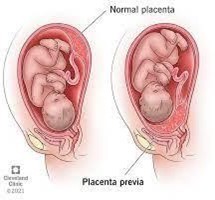A nurse is reinforcing teaching with a client who is at 23 weeks of gestation and will return to the facility the following week for an amniocentesis. Which of the following instructions should the nurse include?
Empty her bladder immediately prior to the procedure.
Refrain from eating breakfast on the day of the procedure.
Give herself a hypertonic enema the day before the procedure.
Wash her abdomen with soap and water the morning of the procedure.
The Correct Answer is A
Choice A rationale: An amniocentesis involves inserting a needle through the abdominal wall into the amniotic sac to obtain a sample of amniotic fluid. Emptying the bladder before the procedure reduces the risk of bladder puncture during the process.
Choice B rationale: Fasting is not typically necessary for an amniocentesis. It is generally done on an outpatient basis, and fasting is not required.
Choice C rationale: An enema is not necessary before an amniocentesis and is not part of the standard preparation.
Choice D rationale: While cleanliness is important, this instruction is not specific to an amniocentesis and is not a standard pre-procedure requirement.
Nursing Test Bank
Naxlex Comprehensive Predictor Exams
Related Questions
Correct Answer is C
Explanation
Choice A rationale: While colostrum is present in the first few days after delivery, it takes a few more days for breast milk to "come in" and increase in volume.
Choice B rationale: Waiting for 6 to 8 days for breast milk to come in would be too long after childbirth. Breast milk typically "comes in" sooner, around 3 to 5 days after delivery.
Choice C rationale: Colostrum, the first milk, is typically produced in small amounts during the first few days after delivery. Breast milk usually "comes in" or increases in volume around 3 to 5 days after childbirth. This transition from colostrum to mature milk is normal and expected.
Choice D rationale: Waiting for 10 days for breast milk to come in would be too long after childbirth. Breast milk typically "comes in" sooner, around 3 to 5 days after delivery.
Correct Answer is D
Explanation
Choice A rationale: Applying ice to the perineal area is not indicated in the case of suspected placenta previa. Placenta previa is related to the location of the placenta in the uterus and is not affected by the perineal area. Ice is commonly used for perineal discomfort after vaginal delivery but is not appropriate for placenta previa.
Choice B rationale: When a client is suspected to have placenta previa, a vaginal exam should be avoided because it can cause trauma to the placenta, leading to significant bleeding. Placenta previa is a condition where the placenta covers part or all of the cervix, and any disruption of the placenta can result in bleeding, which poses a risk to both the mother and the baby. Therefore, a vaginal exam is contraindicated in this situation.
Choice C rationale: Performing a rectal exam is also not appropriate for a client with suspected placenta previa. Rectal exams do not provide any relevant information about the placenta's location, and they can potentially cause discomfort or bleeding in this situation.
Choice D rationale: Applying an external fetal monitor is an appropriate action when caring for a pregnant client, regardless of whether there is a suspected placenta previa. The external fetal monitor is used to assess the baby's heart rate and uterine contractions and is a routine part of prenatal care. However, it does not specifically address the issue of placenta previa. The nurse should be vigilant for any signs of bleeding or changes in fetal heart rate pattern, which may indicate placental issues, and report them promptly for further evaluation and management.

Whether you are a student looking to ace your exams or a practicing nurse seeking to enhance your expertise , our nursing education contents will empower you with the confidence and competence to make a difference in the lives of patients and become a respected leader in the healthcare field.
Visit Naxlex, invest in your future and unlock endless possibilities with our unparalleled nursing education contents today
Report Wrong Answer on the Current Question
Do you disagree with the answer? If yes, what is your expected answer? Explain.
Kindly be descriptive with the issue you are facing.
